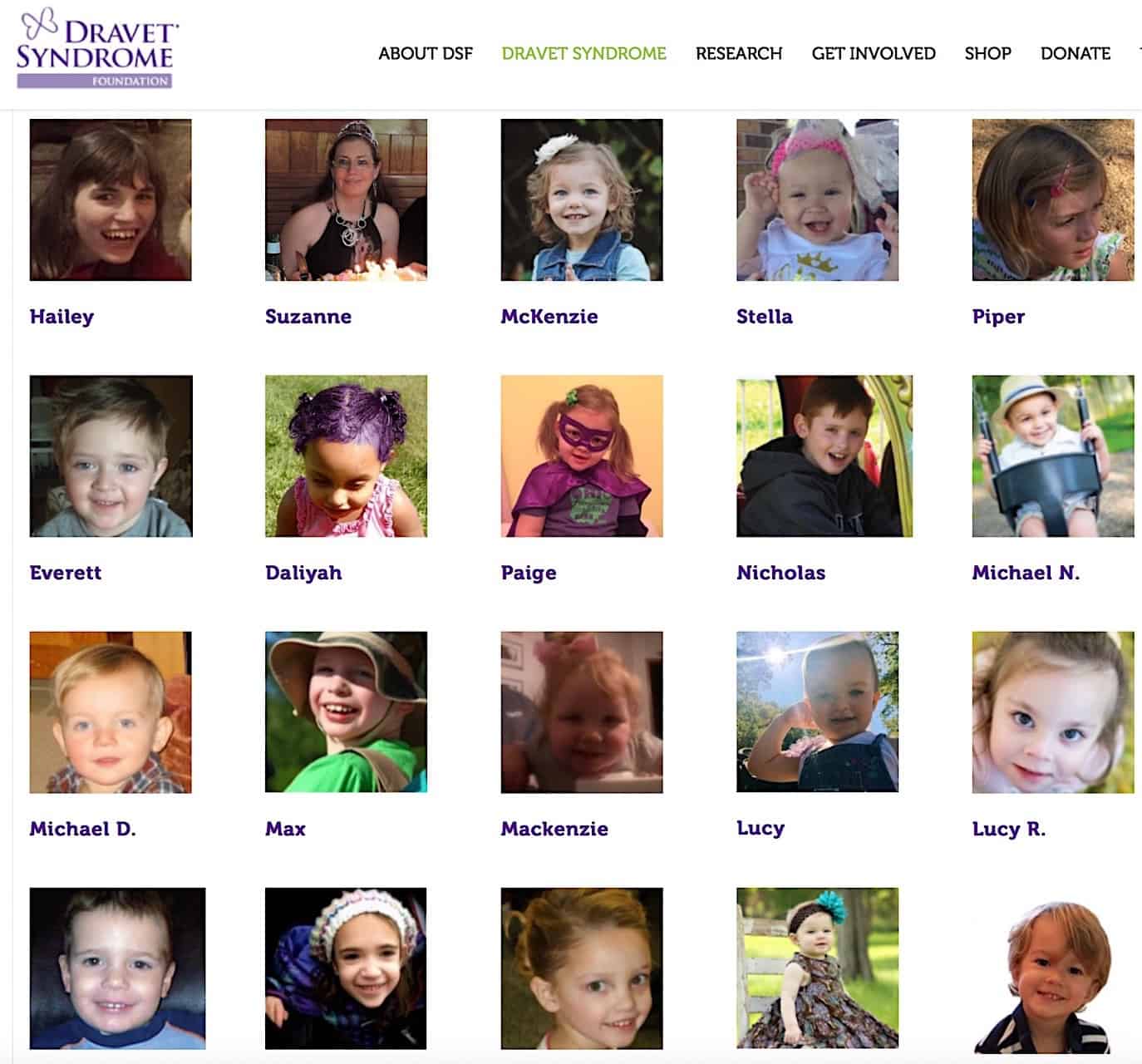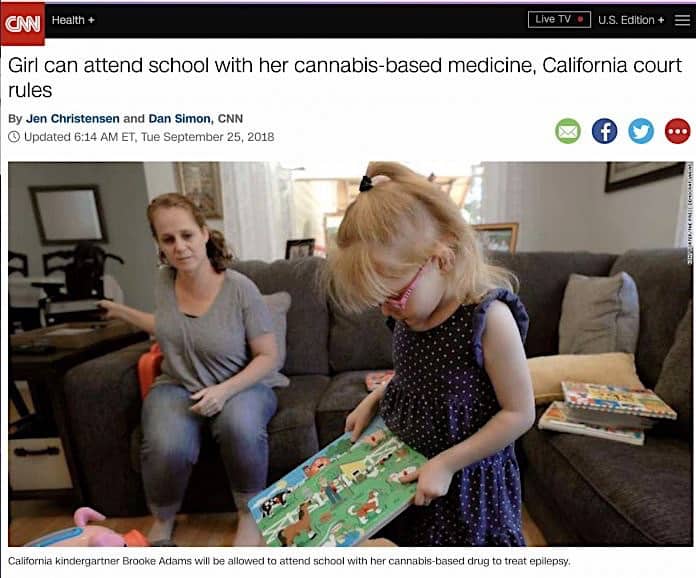A new administrative court ruling requires a Northern California school district to allow a 6-year-old kindergartner with a severe form of epilepsy to ride the school bus with a prescribed cannabis oil-based pharmaceutical. The cannabidiol medicine is exclusively carried and administered by her LVN nurse upon onset of the girls epilepsy symptoms, including on the school bus she rides daily.
The ruling could force student transporters nationwide to reevaluate current school district guidelines for transporting students with disabilities and special health care needs.
Brooke Adam was diagnosed with Dravet syndrome, a rare, genetic and extreme form of epilepsy that results in unpredictable, prolonged and difficult-to-manage seizures. Dravet presents itself during a patient’s first year of life as frequent fever-related seizures that progress to life-long myoclonic epilepsy, or involuntary muscle spasms, and often much worse. The condition occurs in one out of every 20,000 to 40,000 births.
The Dravet Syndrome Foundation said the condition not only requires constant care, but also severely impacts the quality of life. Dravet has a 15- to 20-percent mortality rate that is characterized by the sudden unexpected deaths caused by the seizures. It often can result in behavioral and developmental delays, movement and balance issues, orthopedic conditions, delayed language and speech, sleeping difficulties and chronic infections.
A study published last year in the New England Journal of Medicine indicates that cannabidiol, one of at least 113 naturally-occurring cannabinoids in hemp plants, showed a much greater reduction in convulsive seizures when compared to standard anti-seizure medications. The U.S. Food and Drug Administration approved the orally-ingested cannabidiol Epidiolex on a trial basis. Then on June 25, it formally approved it for use by patients as young as 2 years old who are diagnosed with Dravet syndrome and Lennox-Gastaut syndrome. Epidiolex is nonintoxicating, since it does not contain THC, the primary psychoactive component of marijuana.
Doctors had been prescribing Epidiolex to Adam to help manage her seizures. But the Rincon Valley Union School District in Santa Rosa, located about 55 miles north of San Francisco, refused to allow her to board the school bus with the medication for the current school year. Instead, the district offered the girl one hour of home-based schooling per day, which the parents rejected as being inadequate. Last year, the district paid for Adam’s transportation to a private preschool.
A Sept. 21 ruling by the California Office of Administrative Hearings’ Special Education Division found that the school district’s plan of action for this school year was inadequate and unworkable, and violated the Individuals with Disabilities Education Act.
The district’s plan, the court found, also did not meet state educational standards and failed to conform to Adam’s individualized education plan (IEP).
For school districts and student transporters, the debate also involves the question of “how to administer medication that is both safe and noninvasive to a child in crisis, especially aboard a school bus, where neither a medical practitioner nor a school nurse may be present,” explained Dr. Joseph O’Neil, a developmental-behavioral pediatrician based at the Riley Hospital for Children in Indianapolis, during the 2016 TSD Conference in Louisville, Kentucky. He discussed his own findings on the issue during a panel discussion on “Rescue Medications on the School Bus.”
Confusion Over Illegal Drugs Versus Medical Prescription
Meanwhile, on Thursday, the U.S. Department of Justice and the Drug Enforcement Administration announced that Epidiolex is now a Schedule V substance—the least restrictive schedule under the Controlled Substances Act.
“DEA will continue to support sound and scientific research that promotes legitimate therapeutic uses for FDA-approved constituent components of cannabis, consistent with federal law,” stated Acting DEA Administrator Uttam Dhillon. “DEA is committed to continuing to work with our federal partners to seek ways to make the process for research more efficient and effective.”
Related: The Application Of Rescue Medications On The School Bus
Related: TSD Conference Speaker Spotlight: Cheryl Wolf
Rincon Valley School District officials were concerned about the perception of allowing an illegal drug to be used on campus, whether it was prescribed by a physician or not. “CBD is currently a Schedule I substance because it is a chemical component of the cannabis plant,” FDA officials noted.
Because of the unique nature of Adam’s condition and how it must be treated each day, and her medicine’s status as a notorious and illegal Schedule 1 drug, it appears that the school district and its services, such as school bus transportation, became embroiled in a fight over how the district interpreted the provision of its services. Now that the DEA has downgraded Epidiolex to Schedule V status, the legal situation has changed.
According to the court, the plaintiff and her parents proved that the student had to have “prompt access” to the emergency medication, in order for her to be able to attend school. “She also proved that, in two years of preschool, mother and student’s nurse successfully provided her with prompt access to [cannabis oil] as an emergency seizure medication.”
The court observed that the student succeeded in establishing that her banishment “from its campus and school bus was not based on her educational needs, but on the concern that her presence, with her medication, might violate state and federal law.” Further, the court said, the student, LVN, and parents fully complied with California’s medical marijuana laws regarding possession, administration and ingestion of the medicine.
The girl’s exclusion from the school and bus, the court agreed, “was based on a misunderstanding of state law.” The school district was essentially way too concerned about the “remote possibility that possessing cannabid oil might violate an unenforced and unenforceable federal misdemeanor, prohibiting marijuana possession.”
Factual Findings of the Case
The student previously attended Humboldt Community School, a private preschool, at Rincon Valley Union’s expense. Adam was accompanied at all times at school and on the school bus by a licensed vocational nurse (LVN), who carried with her the cannabid oil “as a rescue medication.” The nurse administered the oil immediately upon seeing the warning signs of an imminent seizure (flushed face, red neck, spasmodic movement, etc.), by spraying it on the inside of the girl’s cheek and using an oxygen pump. No one else had access to the vials of cannabis oil, the court confirmed.
If a seizure lasts longer than four minutes, the nurse has to call 911. The LVN also established that Adam’s medical requirements, especially the presence of the nurse and her medicine, “did not disrupt” the classroom.
Dr. Joseph Sullivan has treated Adam since she was 3 years old and testified at the hearing (by declaration). He is a pediatric neurologist and assistant professor of clinical neurology at the University of California, San Francisco, and director of its Pediatric Epilepsy Center. He is considered to be a leading expert on Dravet and also chairs the UCSF Dravet Clinic.
The district’s assistant superintendent for student services, who also supervises its special education program, testified that the district also barred the girl from its campus, “in part to avoid jeopardizing the district’s funding mechanisms. She testified that to receive federal funding, the district was required to provide a declaration that it would have drug- and alcohol-free campuses.”
Adam’s attorneys also argued that the district’s proposed IEP violated the Americans With Disabilities Act, but the court decided that the Office of Administrative Hearings had “no jurisdiction over it.”

















